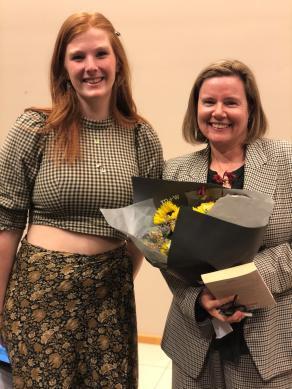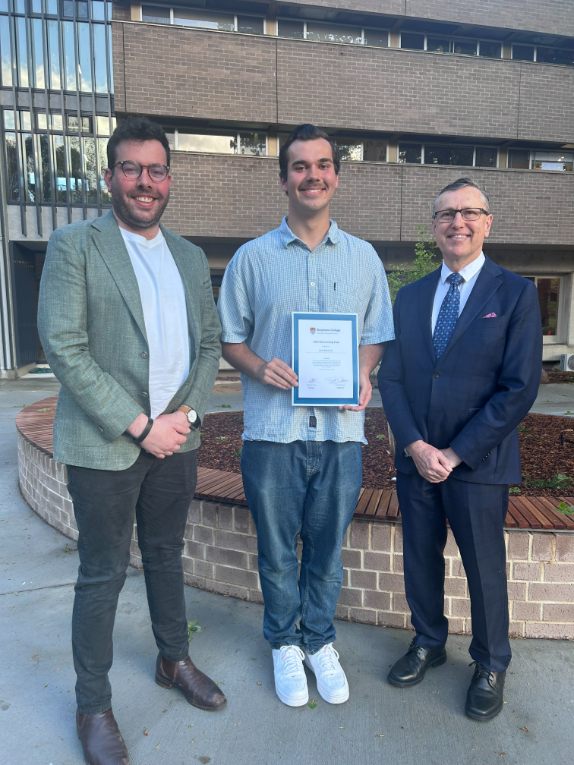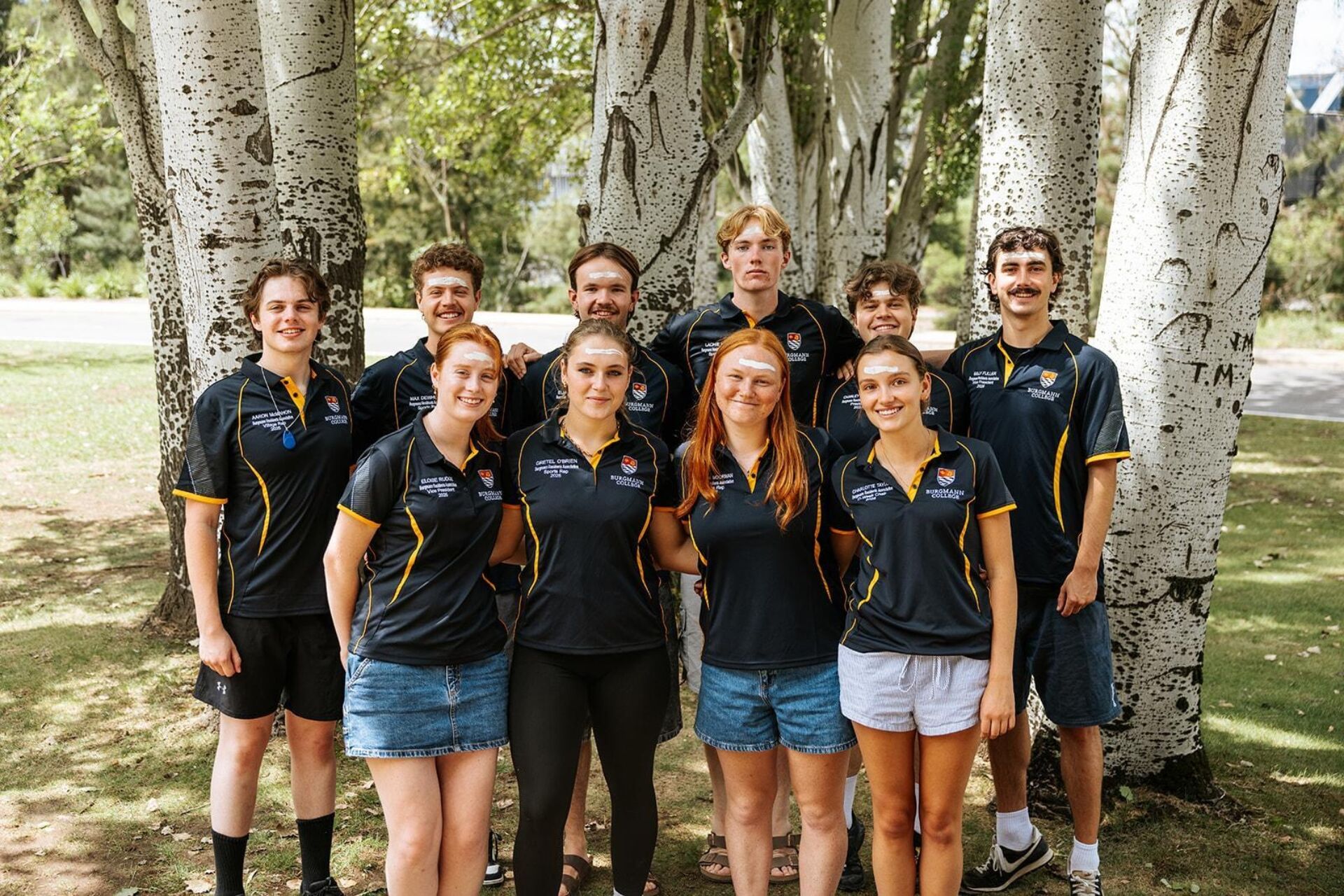
E M Cumming Essay Prize
Modern Essays Inspired by Books of the Bible
With thanks to a generous donor, the E M Cumming Essay Prize is an annual $1,000 prize open to all Burgmann residents, where a 1,000 words or less essay is read before a specially-convened meeting. Topics each year centre on books of the Bible, as named and listed in the Authorised Version of 1611.
Read below for more information about our winning residents from previous years.
2023 E M Cumming Essay Prize
Prize not awarded in 2023.
2022 E M Cumming Essay Prize
Announcing the 2022 Winner of the E M Cumming Essay Prize
Congratulations to Sophie Rosen who has won this year’s E M Cumming Essay Prize for her essay, And Abel.
Topics for the E M Cumming Essay Prize centre on books of the Bible, as named and listed in the Authorised Version of 1611.
This year, essay themes were to draw from Samuel 1 and Samuel 2.
Asked about the inspiration and themes for her essay, Sophie said:
For the piece, I drew from my experiences spending time with family and suddenly being gripped by the quietly terrifying realisation that nothing lasts forever. I have felt this way since I was very small, but only thought to write about it after feeling directly attacked by the poem We Have Not Long to Love by Tennessee Williams, and realising that I was not alone in this feeling, for there was a man in Mississippi in 1956 who also understood it. After that revelation, these themes were originally the subject of a screenplay I was writing; however, I adapted them for the competition.
Dr Lucy Neave, author and ANU senior lecturer, and adjudicator of this year’s E M Cumming Prize, said this about this year's entries:
The other pieces were all excellent. The entries included a poem with a Biblical theme; a reflection on leadership, and who makes an effective leader; a piece about immorality and conquest—which was eloquently and compellingly written; and, a story about the loss of a child, which was also moving and effective. The entries comprise an incredibly diverse and engaging selection of pieces that showcase the skills of Burgmann’s writers.
Congratulations to all residents who submitted essays for the 2022 E M Cumming Prize:
- Eli Narev
- Erin Blond
- Will Adams
- Will Salkeld
Read Sophie Rosen's And Abel.

2021 E M Cumming Essay Prize
Announcing the 2021 Winner of the E M Cumming Essay Prize
Congratulations to Will Salkeld who has won this year’s E M Cumming Essay Prize for his essay, Naomi.
Topics for the E M Cumming Essay Prize centre on books of the Bible, as named and listed in the Authorised Version of 1611.
This year, essay themes were to draw from the Book of Ruth.
Asked about the inspiration and themes for his essay, Will said:
Raised in an atheist family, Ruth was the first book of the Bible I ever read! I found that to be an advantage because my impressions and interpretations were all my own. I could see the good: the unbreakable bond between Naomi and Ruth, their sisterhood, and the power of connection in turmoil. I could also see the bad: the socio-economic reliance on men and the subsequent lack of prospects for women without a man presented in the book. I felt like I’ve known a Naomi, known an Elimelech, and known a Ruth. Their stories are real today, and I tried to convey that in the essay.
Lara Nicholls, Residential Fellow, and adjudicator of this year’s E M Cumming Prize, said this about Will’s essay:
Will Salkeld's essay simply titled Naomi recasts the biblical story of Ruth into a dystopian domestic context of today's world where the widowed Naomi struggles to relinquish the spectre of her recently deceased husband, who is still controlling her emotions and daily life from the grave.
Like its biblical counterpart in the Old Testament, Will's story is still one about brides, widows and daughters and their contested position within a patriarchy that deprives them of agency and power. However, he subverts the mythology inherent in this archetypal narrative and reveals the danger and harm of gender-based stereotypes that see the modern-day Naomi left penniless, homeless, and beholden to the charade of her late husband's double life.
Will then resolves the problem by reuniting her with the women in her family who give her a home(land) and an emotional shelter, just like Ruth's loyalty towards her mother-in-law, Naomi, in the Old Testament version.
Congratulations to all residents who submitted essays for the 2021 E M Cumming Prize:
- William Adams
- Isabella Davies
- Sophie Rosen
- Patrick Coleman
Lara said of the submissions:
Five serious writers to watch in the future! Congratulations to all entrants—not only did you write meaningful and valued essays, but you reminded us all of the power of the written and spoken word.
Read Will Sakeld’s Naomi.
Will is studying a Bachelor of Politics, Philosophy and Economics. He is a 2nd year resident, BRA Arts Rep, and Burgmann Academic Network Coordinator for the Arts. Will was recently elected to the role of BRA Vice-President for 2022. Congratulations, Will, from your fellow residents and the Burgmann College staff.

2020 E M Cumming Essay Prize
Evocative story of summer and judgment wins 2020 E M Cumming Essay Prize
Congratulations to first-year Burgmann resident Poppy Thompson for winning the 2020 E M Cumming Essay Prize with her submission Summer of Flies.
Topics for the E M Cumming Essay Prize centre on books of the Bible, as named and listed in the Authorised Version of 1611.
This year, essay themes were to draw from the Book of Judges.
Summer of Flies follows a young boy through the first few waking hours of a Sunday in the rural town of Wahratta in the summer of 2019—the hottest summer on record. As his town is threatened by the bushfires, many turn to religion and prayer. One morning, he sees a spider kill a fly and, in turn, kills the spider. As a barrage of smoke descends, he believes his ‘killing’ is the reason for this smoke—a punishment.
In discussing the inspiration behind the story, Poppy said:
My piece is ultimately about how killing acquires more killing, about how death has a knock-on effect. The Book of Judges was the perfect stimulus for this because, truth be told, it has a lot of killing in it. There was one particular line: 'Now the children of Judah had fought against Jerusalem and had taken it and smitten it with the edge of the sword, and had set the city on fire.' (Judges 1:8)
Apparently ‘children’ has since been replaced with ‘man’, but the sentiment remained: how would this impact a child’s perception of the world, of right and wrong? There are so many institutions (the church, the justice system, television, etc.) that encourage a contradictory duality of killing: it is wrong to kill and yet people do it all the time without being reprimanded.
The prize was adjudicated this year by Residential Fellow Lara Nicholls, who praised the essay's measured prose and profound meaning.
Poppy’s essay is an extraordinary example of literature composed by a writer with the gift of language. Summer of Flies shows how an economy of language can be replete with subtle gestures and metaphor while showing us a doorway into the moment it is describing. Poppy meters out her words as though she holds an eyedropper, carefully letting them fall on the page in an elegant rift that cajoles the reader ever forward through young Benjamin’s morning of internal tempest.
The concept of Judges—the sins of excessive careless living followed by a confession, penance, then absolution and the gift of leadership of a higher spiritual voice, then the repetition of the cycle all over again—hovers in the background throughout Summer of Flies like an unseen cue card.
I hope you all enjoy reading this beautifully crafted short story by a young Burgmann woman who is bound to find herself at her own book signing one of these days!
Many thanks to our anonymous donor for their generous support of the E M Cumming Essay Prize, which awarded $1,000 to Poppy for her winning essay.
Read Poppy Thompson’s Summer of Flies.

Inaugural E M Cumming Essay Prize
The inaugural E M Cumming Essay Prize
The inaugural E M Cumming Essay Prize competition was held in September 2014. Residents were invited to submit an essay on the topic of Genesis. Many outstanding essays were received and our adjudicator, Bettina Söderbaum (1977–1978), selected five finalists who have kindly allowed us to publish their essays.
Ella Relf's winning essay, Genesis, was announced at an evening reading on 27 September 2014 and was awarded $1,000.
The College would like to congratulate Ella, and wishes to acknowledge the incredible submissions centred on the theme of Genesis from these other Burgmann residents:



